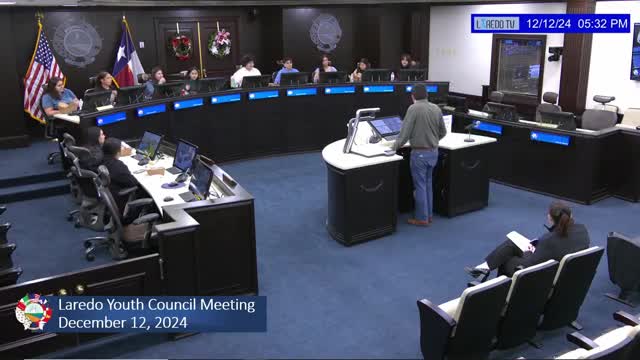Laredo environmental and solid-waste staff outline stormwater maintenance, anti-dumping enforcement and landfill projects
Get AI-powered insights, summaries, and transcripts
Subscribe
Summary
City Environmental Services and Solid Waste staff told the Laredo Learning Council on Dec. 12 that crews are expanding stormwater maintenance, enforcing illegal dumping with cameras and higher fines, and planning composting and landfill-gas projects while continuing recycling and household hazardous-waste events.
John Porter, director of Environmental and Solid Waste for the City of Laredo, told the Learning Council on Dec. 12 that the merged Environmental Services and Solid Waste departments oversee stormwater, hazardous-materials permitting, illegal-dumping enforcement and household hazardous-waste and electronic-waste programs.
The presentation emphasized the city’s Municipal Separate Storm Sewer System (MS4) work to stop nonpoint-source pollution from reaching the Rio Grande, including routine cleaning of storm pipes, televising lines, and targeted enforcement. "We have these special trucks that are called combination vacuum jetting trucks," said Juan Vasquez, environmental supervisor for the stormwater division, explaining the department’s vacuum-and-jet equipment and CCTV camera van used to document condition before and after maintenance. Vasquez described nozzle configurations and said one nozzle was “shooting 40 gallons per minute ... at a PSI of 2,000.” He noted home and larger pipe sizes can range from 24 inches to 60 inches.
Staff described routine findings during inspections: cross-connections of sanitary lines into storm sewers, abandoned electronics and household hazardous materials, weapons and, in some cases, people sheltering inside large storm conduits. "We located the issue. We reported it over to the enforcement department," Vasquez said of a detected illegal sanitary connection. The presenters said crews use pole cameras and confined-space testing before any entry.
Ivan Santoyo, environmental engineer, outlined enforcement as a last resort after education and engineering. He described camera deployments at repeat dumping locations, follow-up investigations to identify culprits and the city’s ability to capture vehicle license plates for enforcement. Santoyo said the state increased the previous maximum fine for illegal dumping from $2,000 to $4,000; the department also works with police for arrests in some cases.
Recycling and outreach were covered by Sylvia Garces, recycling coordinator, who detailed school and community programs such as America Recycles Day presentations, landfill and recycling-center tours, and a paint-reuse program that separates usable paint for community use. Alejandro Ramirez, Solid Waste, described collection schedules and the city landfill: the landfill accepted about 430,000 tons of municipal waste last year, Ramirez said, compared with about 375,000 tons in 2019; he said the city expects continued growth and “probably next year, we’ll be at 450,000 tons.” Ramirez listed services for residents: curbside collection, bulky-item pickups (twice yearly by district), mulch made from ground brush (available for free while stock lasts), and a scrap-metal recycling program that recovered 942 tons last year.
Staff outlined near-term projects and program changes. They are pursuing a composting program that requires a permit modification and construction; staff said they hope to begin that work next year. They also described plans to pursue a landfill gas–to–pipeline project to capture methane now flared at the site and convert it into a revenue stream once processed and tied into a nearby pipeline. Ramirez said the city has a second landfill cell but will not move operations to the new site — about nine miles outside the city — until current capacity requires it, estimating roughly 20 to 25 years at current rates.
The presentation closed with an invitation to upcoming household hazardous-waste collection events and volunteer activities such as Earth Day and tree plantings. Staff urged residents to report illegal dumping with photos and, when possible, license-plate information to improve enforcement outcomes.
The department’s presenters left councilors and students with a practical message: individual actions — from washing cars to proper disposal of paint and motor oil — affect stormwater quality and, ultimately, the Rio Grande. "If you dump it, you drink it," Santoyo said.
The department provided several operational figures and planned projects but no formal council votes on policy or rate changes at the Dec. 12 meeting; staff said many initiatives will require permits, bid processes or separate approvals.
